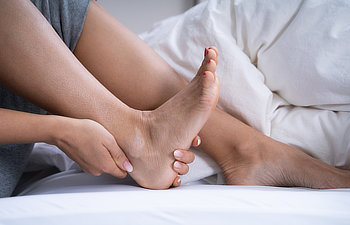Can Obesity Cause Flat Feet?

In recent years, obesity has become a significant public health concern, affecting millions of individuals worldwide. While the health implications of obesity are widely recognized, one area that receives less attention is its impact on foot health, particularly the development of flat feet. NYC foot surgeon Stuart J. Mogul, DPM, FACFAS, explores the connection between obesity and flat feet, shedding light on the underlying mechanisms and potential solutions.
What Are Flat Feet?
Flat feet, also known as pes planus or fallen arches, occur when the arches of the feet are either absent or significantly reduced. Individuals with flat feet often experience a range of symptoms, including pain in the feet, ankles, knees and lower back, as well as difficulty with walking or standing for extended periods. Flat feet can be congenital (present at birth) or develop over time due to various factors, including injury, aging and certain medical conditions.
The Link Between Obesity and Flat Feet
The World Obesity Federation reports that over one billion people worldwide are obese. A Time Magazine report claims that more than half of the world will be obese by 2035. Obesity is a serious problem and it is directly connected to flat feet.
- Increased Pressure on the Feet: One of the primary ways obesity contributes to flat feet is through increased weight and pressure on the structures of the foot. The arches are designed to absorb shock and support the body’s weight. However, excess weight can cause these structures to flatten more easily over time, leading to the development of flat feet.
- Altered Biomechanics: Obesity can change the way a person walks, runs or stands. The additional weight often leads to altered biomechanics that can stress the foot’s ligaments and muscles, resulting in weakened foot muscles and flat-footedness.
- Joint Strain: Excess weight can place additional strain on joints, including those in the feet and ankles. This strain can cause wear and tear on the ligaments and tendons that support the arch, increasing the likelihood of developing flat feet.
- Inflammatory Responses: Obesity is often associated with chronic inflammation. Inflammatory processes can affect the soft tissues of the foot, potentially leading to pain and structural changes that can result in flat feet.
Preventing and Managing Flat Feet in the Context of Obesity
Dr. Mogul recommends the following actions to care for your feet if you are obese:
- Weight Management: Maintaining a healthy weight is crucial for preventing flat feet. Engaging in regular physical activity, following a balanced diet and seeking professional guidance can assist in weight loss and management.
- Footwear Choices: Wearing supportive shoes that provide proper arch support is essential, especially for those struggling with obesity. Avoiding high heels and flip-flops can also alleviate pressure on the feet.
- Orthotic Supports: Custom orthotics can provide additional arch support and distribute pressure more evenly across the feet.
- Regular Check-Ups: Regular visits to Dr. Mogul can help monitor changes in foot structure and function, allowing for early intervention if flat feet develop. Dr. Mogul can prescribe exercises to help strengthen the muscles of the foot, improve overall biomechanics, enhance arch support and alleviate symptoms.
UES Flat Foot Pain Treatment Specialist
Obesity can cause flat feet or aggravate an already existing condition. Dr. Mogul is an experienced and trusted UES flat foot pain treatment specialist who can evaluate your foot condition and create a treatment plant to alleviate pain and other symptoms. Contact him today for a consultation.
Posted on behalf of
1111 Park Avenue Suite 1B
New York, NY 10128
Phone: (212) 769-0066
Email: contact@footsurgerycenternyc.com
Monday - Friday 8:30 AM – 6:00 PM
